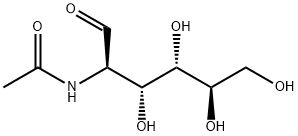N-Acetyl-D-glucosamine , 97% , 7512-17-6
Synonym(s):
N-Acetyl-D -glucosamine;D -GlcNAc;2-Acetamido-2-deoxy-D -glucose;N-Acetyl-D-glucosamine - CAS 7512-17-6 - Calbiochem;NAG, GlcNAc
CAS NO.:7512-17-6
Empirical Formula: C8H15NO6
Molecular Weight: 221.21
MDL number: MFCD00136044
EINECS: 231-368-2
| Pack Size | Price | Stock | Quantity |
| 10g | RMB23.20 | In Stock |
|
| 25g | RMB34.40 | In Stock |
|
| 100G | RMB86.40 | In Stock |
|
| 500G | RMB317.60 | In Stock |
|
| 2.5kg | RMB1397.60 | In Stock |
|
| others | Enquire |
PRODUCT Properties
| Melting point: | 211 °C (dec.) (lit.) |
| alpha | 42 º (c=2,water,2 hrs) |
| vapor pressure | 8Pa at 20℃ |
| refractive index | +39.0 to +42.0 ° (C=1, H2O) |
| storage temp. | -20°C |
| solubility | Soluble in concentrated hydrochloric acid, sulfuric acid, phosphoric acid and formic acid. Insoluble in water, dilute acids, dilute alkalis, concentrated alkalis and organic solvents. |
| form | saline suspension |
| Boiling point: | 636.4±55.0 °C(Predicted) |
| Density | 1.54 g/cm3 |
| pka | 13.04±0.20(Predicted) |
| color | white to off-white |
| optical activity | Alpha type +75 → +41 Beta type -22 → +41.3 |
| biological source | crab (red) |
| Water Solubility | H2O: 50 mg/mL colorless to faint yellow solution, clear to very slightly hazy |
| Sensitive | Hygroscopic |
| Merck | 14,4458 |
| BRN | 1727589 |
| Stability: | Stable. Incompatible with strong oxidizing agents. |
| InChIKey | OVRNDRQMDRJTHS-ROGOILFBSA-N |
| LogP | -2.2 at 23.7℃ |
| CAS DataBase Reference | 7512-17-6(CAS DataBase Reference) |
| EPA Substance Registry System | N-Acetylglucosamine (7512-17-6) |
Description and Uses
N-Acetyl-D-Glucosamine is the N-acetyl derivative of glucosamine.Chemically it is an amide between glucosamine and acetic acid. A single N-acetlyglucosamine moiety linked to serine or threonine residues on nuclear and cytoplasmic proteins -O-GlcNAc, is an ubiquitous post-translational protein modification. O-GlcNAc modified proteins are involved in sensing the nutrient status of the surrounding cellular environment and adjusting the activity of cellular proteins accordingly. O-GlcNAc regulates cellular responses to hormones such as insulin, initiates a protective response to stress, modulates a cell's capacity to grow and divide, and regulates gene transcription. In humans, it exists in skin, cartilage and blood vessel as a component of hyaluronic acid, and bone tissue, cornea and aorta as a component of keratan sulfate.
N-Acetyl-D-glucosamine (D-GlcNAc) is a derivitized glucose monomer found in polymers of bacterial cell walls, chitin, hyaluronic acids and various glycans. It is also synthesized in the glycosylation pathway as uridine diphosphate (UDP-GlcNAc), which can then be released following degradation of glycosylated proteins.D-GlcNAc is used to identify, differentiate and characterize N-acetyl-β-D-hexoaminidase(s). It is also used in the treatment of osteoarthritis and inflammatory bowel disease (IBD), including ulcerative colitis and Crohn's disease. Further, it is used as a substrate in sialic acid production, cosmetics and in drug development research.
N-Acetyl-D-glucosamine is used in the identification and characterization of N-acetyl-beta-D-hexoaminidase. It is also used in the treatment of osteoarthritis and inflammatory bowel disease (IBD), including ulcerative colitis and Crohn's disease. Further, it is used as a substrate in sialic acid production, cosmetics and in drug development research.
Safety
| Symbol(GHS) |  GHS05 |
| Signal word | Danger |
| Hazard statements | H314 |
| Precautionary statements | P280-P305+P351+P338-P310 |
| Hazard Codes | Xi |
| Risk Statements | 36/37/38 |
| Safety Statements | 24/25-36-26-22 |
| WGK Germany | 3 |
| RTECS | LZ6651000 |
| F | 3-10 |
| Hazard Note | Irritant |
| TSCA | Yes |
| HS Code | 29329985 |



